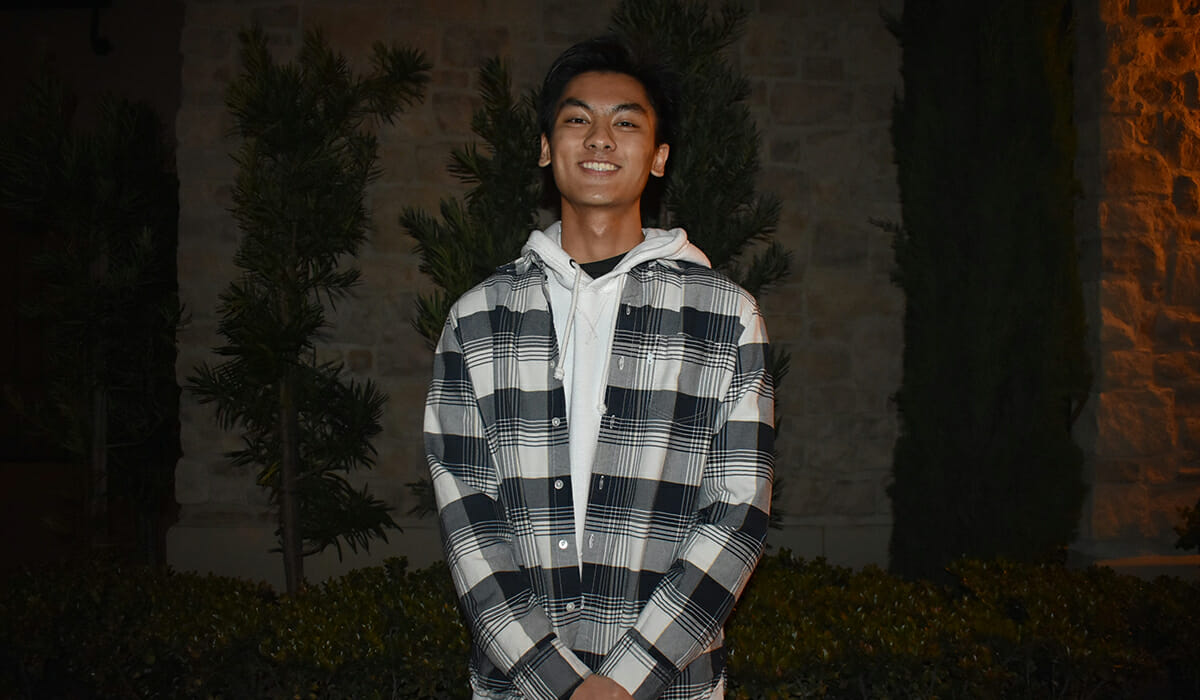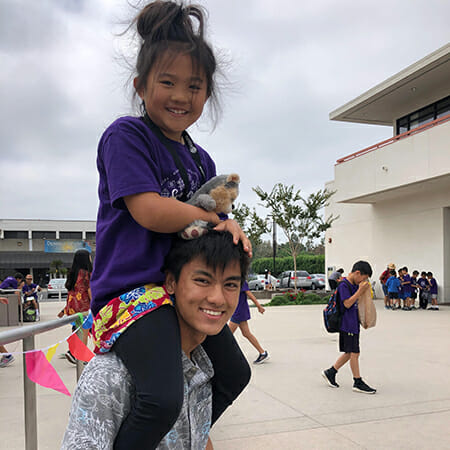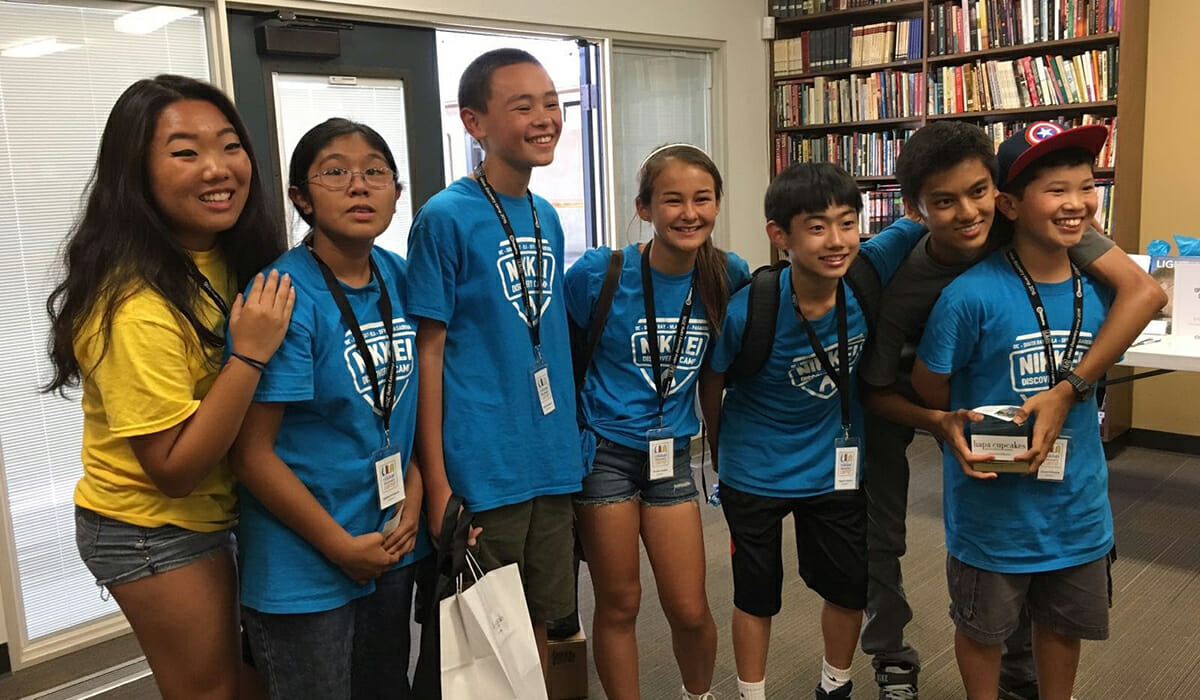Teen Serves Community’s Youth Through Multiple Volunteer Organizations

Meet Daily Point of Light Award honoree Kyle Sugita. Read his story and nominate an outstanding volunteer or family as a Daily Point of Light.
At just eighteen-years-old, Kyle Sugita is doing more than his part to positively impact the young people in his community by volunteering for not one, but two different youth-based organizations in his Irvine, Calif. hometown.
Kyle serves as a Junior Counselor for a summer camp provided by Kizuna, a cultural youth group that offers education and empowerment programs for Japanese Americans. Each summer for the past four years, he has led elementary- and middle school-aged kids through lessons and activities designed to teach them about their heritage.
In addition, he has spent the past year volunteering for the International Youth Neuroscience Association [IYNA], a youth-led nonprofit that offers education and networking to students interested in neuroscience. Kyle, who wants to work in clinical neurology himself, is the President for his high school’s local chapter, and also works as a Junior Editor for the IYNA Journal. He has helped plan a walkathon benefiting the Michael J. Fox Foundation with IYNA’s Fundraising Department, and jumped in to become the stand-in Co-director of the department as the previous Co-director is currently unable to do so. While the walkathon has been cancelled due to the coronavirus pandemic, IYNA has postponed the fundraiser and Kyle will continue planning it, along with continuing his many other volunteer roles in the community.
Describe your volunteer role with Kizuna.
It’s a cultural youth group. It’s mainly for Japanese-American youth. I work with kids aged eight to 13 over the summer. I proctor lessons and classes and activities and teach them about the Japanese-American heritage, which is about internment under Executive Order 9066 back in World War II, it’s about Pearl Harbor, and things that we, as a declining population, are losing sight of. Because we have groups like Kuzina, the next generation gets to remember our traditions and our values.

Why did you want to volunteer in this way?
Mainly because in Irvine where I was raised, there’s not a lot of Japanese Americans. There’s not a lot of Japanese period. I was kind of disconnected from my cultural roots. I attended Japanese language school and through that I was introduced to some people who are directors at Kuzina. I reached out to them and asked if I could be a Junior Counselor and they invited me to participate as an actual counselor over the summer, and I just stuck with it over four years.
What is an average day at Kizuna like?
Every program is a week long at different locations throughout southern California. It’s nine hours for the students and it’s a good ten hours for counselors because they have to clean up and set up. The kids arrive around 8:30 [a.m.] and we introduce them to what the lesson is going to be for that day. We try to make it more fun and interactive for them as we go, so Thursday for example might be Undokai Day, which is Japanese sports festival. Every single activity that we go over in the nine hours is some deviation of sports in Japan, and they’re all connected back to that. It’s a theme that is connected to a bunch of different activities that we stretch over the day so the kids really remember that Monday was this, Tuesday was this. We have one day, usually a Wednesday, where we take the kids on a field trip to Little Tokyo for the day. It’s in Los Angeles. It’s kind of like Chinatown but it’s Japan-based obviously. We take them around to different cultural locations, museums, memorials. One of the famous ones we like to take them to is Go For Broke, which is about the [Japanese-American soldiers] in World War II.
Why is it important for Japanese American youth to be involved in something like this and have knowledge of their cultural roots?
If you look at the statistics, the number of “Japantowns” are declining in number. They’re physically disappearing because of gentrification. Throughout California and throughout the United States, the population of Japanese Americans is physically declining. Access for the few of us left to cultural landmarks, cultural points to actually reconnect and understand where we came from — they’re gone. … For all of the kids that still identify with that Japanese last name or that Japanese heritage, we don’t want them to not know where they came from and not have that community. For me personally, I didn’t know where that community was because of the city I was raised in. It was really nice for me to find a group of people that still care about our heritage. For a lot of younger kids, below the age of 13 even, it matters to them because they’re alone. They don’t have a large friend group that identifies in this way. Through Kizuna, they can be confident that there’s still people out there like them.
Describe your volunteer role with the International Youth Neuroscience Association.
I am a Junior Editor and right now I’m a stand-in Co-director of the Fundraising Department. As a Junior Editor, it’s on the editing committee for the IYNA Journal, which is a neuroscience-specific edited journal where any student in high school or undergraduate level can submit research. It doesn’t have to be conducted in a lab, but if they conduct it via external resources, like NCBI [National Center for Biotechnology Information], they’re allowed to write their own research papers and submit it. Then we, as Junior Editors, revise over a couple rounds and then it gets published after maybe three rounds. In the Fundraising Department, right now we were just planning a fundraiser, a walkathon in Manhattan Beach, but it got cancelled because of the coronavirus [pandemic]. It was supposed to take place on April 18. That was for the Michael J. Fox Foundation. That’s for Parkinson’s disease research. That was our biggest project and it was going really well, but unfortunately because of the restriction on people, we had to cancel that. Then I’m a Chapter President on a local level at the IYNA club at my high school. They were also really involved in planning the walkathon.
Can you describe what IYNA does?
There’s a couple branches. There’s a department called the MYELIN …The department is developing neuroscience as a high school class because right now there is no neuroscience elective in the high school curriculum. The MYELIN department is trying to develop a neuroscience class so that public schools and private schools across the nation and internationally can teach neuroscience to high school students, because it’s not really offered like other ROP [Regional Occupational Program] classes. It’s trying to introduce neuroscience at the high school level.
There’s fundraising, there’s the journal department, there’s the chapter networks — the local chapter networks systems, LCN, and the national chapter network systems, which is NCN, which basically is the most accessible to anybody who wants to join the IYNA. If you are in high school or college you can join your university’s branch of the local chapter network which is a part of the national chapter network. At my club, when I have new members who want to join, that’s what always talk to them about because they can sign up to become a member and they will immediately be a part of the LCN and then they have access to resources on the national level. They can talk to people at other branches and other locations. The main benefit is you can meet other people who have similar interests in the brain. … Neuroscience has a lot of branches. There’s computational neuroscience, there’s neuroengineering, there’s neurosurgery. You can meet all those people once you have access to people at other locations. It’s not just your high school or just your college. That’s one of the biggest networking things that I think the IYNA provides, especially for younger students. Neuroscience is a new field so there’s not a lot of youth groups for it, and IYNA provides the foundation for people to meet other people with similar interests.
Why is it important for neuroscience networks and classes to be available to students as young as high school?
It’s mainly because if you want to go into business for example, you do have an opportunity to take business classes at the local community college. If you want to major in statistics, you have an AP Statistics class at school. If you want to be a biology major, the same thing goes — you have many avenues to explore that in high school. When you’re choosing a major when you’re applying to college, there’s a lot of majors that people just don’t choose because they don’t know what it is. … I want to go into clinical neurology, which is a lot of prescription drugs for neurological conditions, but I have a friend who is in the chapter at my school and she wants to go into computational neuroscience which is completely different. You would go into computer science and some other degree of cognitive science with that. So the opportunity to explore it at an early age helps people tailor and know better, when they apply to college or graduate school, what they’re trying to do with that education or with that pursuit.

What’s been the most rewarding part of your work?
I’m going to say Kizuna. It’s not rewarding in the sense that I see a whole lot of change in the kids, it’s rewarding that I see these kids come back every year. Their parents have to drive them out to the location, but the thing is, the kids want to come back and see the counselors and see their friends and other campers. Even though they’re too young to express that it meant something to them, I know they probably have trouble finding these people who identify in the same way in their elementary schools, for example. You just know as a counselor you had that impact because they keep coming back year after year and their parents aren’t forcing them. They run to you when they arrive at 8:30 in the morning. They want to be there. Even though they’ve seen this lesson for the past two years, they’ve seen these exact same schedules, they’ve been to Little Tokyo three times already, they still come back and that means a lot to me.
Why do you think it’s important for others to give back?
As an intern at UCI [University of California]’s Department of Neurology, I was also an intern at the Department of Neurosurgery. One of the neurosurgeons I talked to, who actually inspired me to join IYNA, he said ‘I’m not practicing neurosurgery because I love neurosurgery, I don’t even love the brain.’ He said, ‘I need to give back to the world that has given me so much.’ At the time he told me that, I didn’t really understand. I couldn’t process, I wasn’t old enough. But what that meant was, the world has given us our memories, our positive experiences, even our negative experiences with other people, and all of these things that we have gone through that have made us our individual selves. The world gave that to us, and it would be so selfish if we didn’t give back, regardless of who benefited from us giving back. The world didn’t care that you specifically, now you have this memory, now you know this about yourself. The world just gave it to you. You should give back to the world knowing that regardless of the name of that kid, or the name of that person you were just kind to or you just gave something to, it’s going to change them in some way, just like the world gave you something regardless of how it changed you.
Do you want to make a difference in your community like Kyle? Find local volunteer opportunities.
